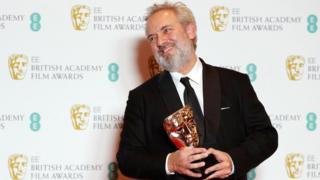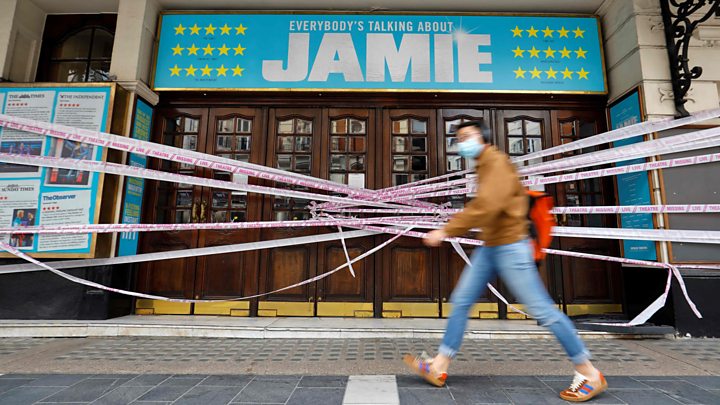Sam Mendes urges film and TV world to help theatre workers 'on the edge'
 Image copyright
AFP
Image copyright
AFP
Sir Sam Mendes has urged more stars, streaming services and studios to donate to theatre workers who have been "effectively ignored" by ministers.
The 1917 and Spectre director has set up a fund that has raised £1.6m so far.
But he said it is "a drop in the ocean" and will help fewer than half of the 4,000 out-of-work actors, directors, writers and others applying for grants.
The government says its £1.57bn arts rescue package is aimed at venues, but will lead to more work for freelancers.
The Oscar-winning director said the enforced closure of theatres could force many creative people to leave the industry.
He launched the Theatre Artists Fund earlier this month with a £500,000 donation from Netflix.
Benedict Cumberbatch, Imelda Staunton, Eddie Redmayne, Colin Firth, Hugh Bonneville and Tom Hiddleston have contributed directly.
Other big names have donated via a public crowdfunding page, which lists Michaela Coel as having given £5,000 and David Walliams as having donated £1,000.

In a statement, he called on "other studios, streaming platforms, business owners, philanthropists and theatre lovers" to dig deep.
The fund currently has enough money to give out 1,600 grants worth £1,000 each. The government's rescue package will be directed at organisations rather than individuals.
"There's a great danger in this rescue package and in the arts world generally that the people who create the actual work fall through the cracks," Sir Sam told BBC Radio 4's Today programme on Friday. "These are the people who actually make the shows that the public pay to see.
"So there's a danger that you're going to have some very healthy arts administrations, accounts departments, foyers and bookshops, but you're not going to have any work to put on the stages, because the people who make that work, who make up 70% of the theatre industry's employees, are being effectively ignored.
"So I wanted to make sure that some of the people who were right on the edge, who might indeed during this period choose to leave the industry entirely, could be protected. But this is really a drop in the ocean."
Sir Sam said he would have struggled to stay in the industry himself if a similar crisis had struck when he was starting out.
"I don't think I would have been able to remain part of the theatre world at that point in my career," he said.
"Anyone listening, I really implore you to think of the future of the theatre and if it's something you've loved or that's changed your life or that you've been a part of and you're now successful, to think of how you might have been when you were 19, 20 or 21 and just starting out."
He also called on the government to let theatres reopen with full audiences from early December.
Audience 'can decide the risk'
"That gives the theatres time to plan not only the shows they are going to do, but the ways in which they can make an audience feel safe. And then it's up to the audience as a matter of personal choice as to whether they do or don't want to take the risk.
"You have to give some sense of hope, some sense of practical concrete possibility, about how the future might map out."
On Thursday, a committee of MPs called for tailored support for creative freelancers, saying many had "expressed disappointment that DCMS [Department for Digital, Culture, Media and Sport] had not properly heard their concerns".
The House of Commons culture select committee also asked the government to name a date for reopening venues at full capacity.
The government has not responded directly to Sir Sam's comments, but in responding to the committee said: "We have worked with urgency, day-in-day-out since the start of the pandemic in providing support for our sectors and on plans to reopen them safely.
"Thousands of organisations and hundreds of thousands of jobs working across culture, the arts, sport and tourism have been saved by furloughing and loan schemes."
Follow us on Facebook, or on Twitter @BBCNewsEnts. If you have a story suggestion email entertainment.news@bbc.co.uk.